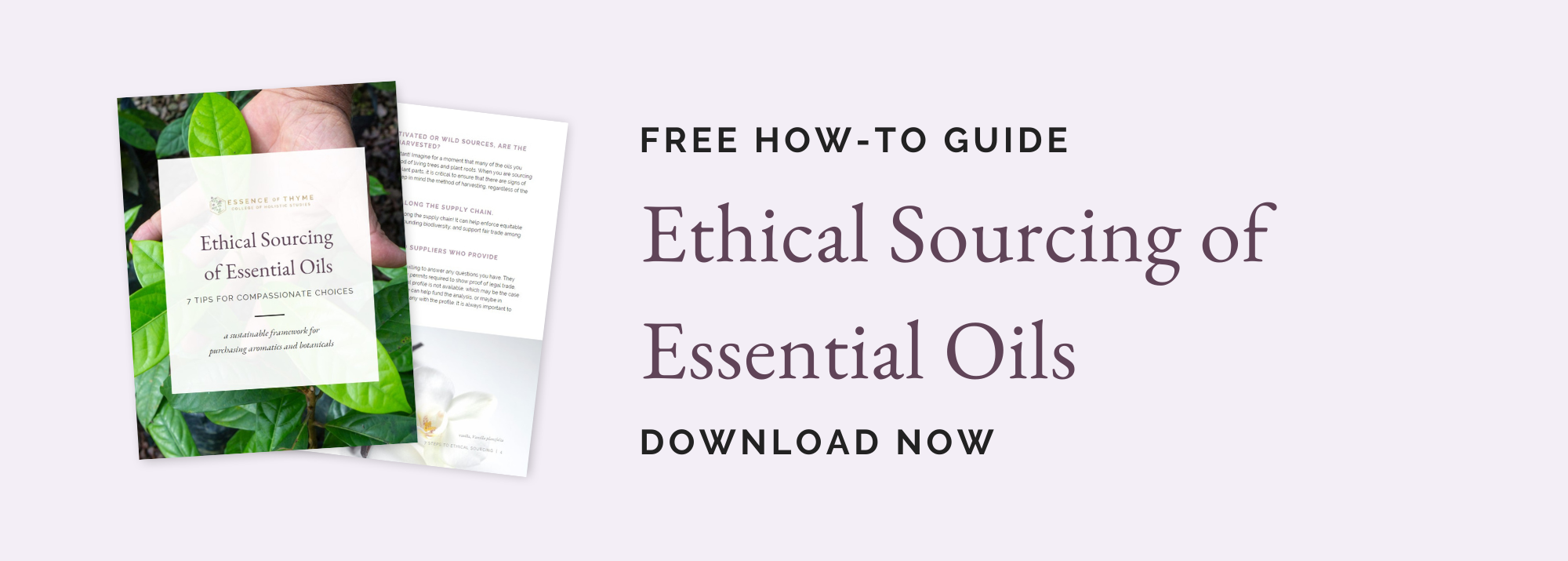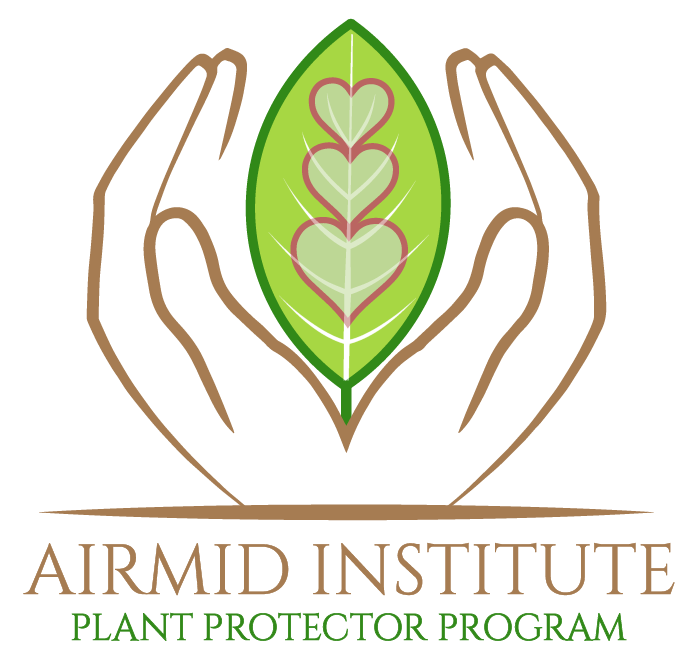Essence of Thyme College of Holistic Studies Joins Airmid Institute Plant Protector Program

As aromatherapists, we know that Nature heals.
And as healers, we have a responsibility to heal the plants first. If we want a bright and sustainable future for the practice of aromatherapy, we must all do our part.
At Essence of Thyme, we take sustainability seriously. Aromatherapy is a path of lifelong study — to us, this is inseparable from learning how to protect and support our planet and its precious plants that support us in return.
Essence of Thyme College of Holistic Studies is pleased to announce our membership in the Airmid Institute Plant Protector Program.
Essence of Thyme is committed to providing advocacy and education in ethical and sustainable aromatherapy.
Throughout our entire curriculum, at all levels of certification, we teach you how to work with essential oils, carrier oils, and other plant materials and supplies within a sustainable framework.
According to Airmid Institute, biodiversity is in a crisis. Why?
- Earth is undergoing its 6th extinction. This extinction is unlike the others: species are being lost at a rapid rate, and the human race is nearly entirely responsible.
- 1,000,000 species are facing extinction (Kolbert, 2019). Although there may be tens of millions of species on Earth, only 2,000,000 have been identified and named. Can you imagine how many more may be facing extinction that we don’t know about?
- 2 out of 5 plant species are facing extinction (“State of the world's plants and fungi,” n.d.). This is 40% of plant species, and is likely an underestimate.
- 13% of medicinal plants are facing extinction (IUCN Red List of Threatened Species, n.d.). This is 13% of the 5,411 medicinal plants assessed under the IUCN.
- 1 out of 3 trees are facing extinction (EPIC, 2021). This is mostly due to extreme weather events brought on by climate change.
- Nearly 10% of essential oil-bearing plants are threatened or near threatened (Airmid, 2021). This percentage doesn’t include species also used in aromatherapy and perfumery, including animals, fungi, and seaweed!
Dr. Kelly Ablard, Co-Principal at Essence of Thyme and Founder of Airmid Institute, shares some of the main challenges we face within the field of aromatherapy.
- Climate change can have severe negative impacts on habitats and result in stressors that affect plant survival and chemistry.
- Habitat disturbance can take the form of habitat fragmentation and habitat degradation; overall habitat disturbance is one of two main reasons why nearly 50% of identified species on Earth are facing extinction.
- Unsustainable management of plants which for example includes a lack of genetic diversity, unsustainable harvesting, no signs of regeneration, and unsustainable business models.
- Lack of education and awareness about sustainability issues within our field, and which, if corrected, is where the biggest impact for change and protection of plants and biodiversity can be made.
Essence of Thyme’s comprehensive aromatherapy certification programs already meet or exceed the criteria for sustainability education as set forth by the Airmid Institute Plant Protector Program.
At Essence of Thyme, we teach you how to:
- Know about key organizations responsible for applying conservation and trade-statuses to plants. We ensure that you are familiar with the Airmid Institute List of Threatened, Near Threatened, and CITES-Protected Plants, Mammals, Fungi, and Seaweed Species Used in Aromatherapy, Perfumery, and Aromatic Herbalism, which you receive as a student. Once a conservation status of a species is understood — as well as where it is threatened and if permits are required for its trade — half the battle of protecting them is won!
- Confidently and ethically source your materials. Ethical sourcing is not as easy as you may think! It requires being finely tuned in to the plant source of the essential oil and having an in-depth understanding of many facets relevant to each plant. Questions around proof of permits, plant parts, wild or cultivated strands, harvesting methods, quality control, traceability, and transparency are critical.
- Successfully develop analogues (alternatives) to essential and carrier oils which are sourced from threatened or near-threatened species. Analogues require a detailed understanding of a plant’s conservation and trade status, clarity around the analogue’s purpose, and other factors such as the part of the plant used, the fragrance profile, therapeutic benefits, chemistry, and safety. Although an analogue can never 100% replace its counterpart, it can achieve similar results, taking pressure off those plants which are much more fragile. Further, when selecting analogues, we highly recommend exploring evidence-based research, bearing in mind experimental design and study limitations.
- Build healthy and lasting relationships with suppliers, colleagues and clients, so you too can educate others about the issues around sustainability in the field of aromatherapy.
Other benefits to Essence of Thyme certification students as part of the Airmid Institute Plant Protector Program:
- 20% discount off annual Airmid Institute membership
- exclusive webinars on key and leading topics in the field of sustainability
- 1:1 personal advising with Dr. Kelly Ablard, Co-Principal of Essence of Thyme, and regular live interaction on topics including essential oil sustainability. This gives you a direct line to a sustainability expert throughout your aromatherapy certification.
Sustainability is woven into every level of education and student support through Essence of Thyme, from our electives to our certification programs. Our dedication to fostering ethical aromatherapy education inspired us to officially join the Airmid Institute Plant Protector Program. We are honoured to help advance Airmid’s mission: bringing healing to not only these fragile plants we hold so dear, but also to the planet as a whole.
How do you know if your essential oils come from threatened — or even near-threatened — plants? Download our free guide below.
About Essence of Thyme College of Holistic Studies
Essence of Thyme College of Holistic Studies offers 300- and 630-hour professional aromatherapy certification programs that help you grow a successful, fulfilling career by specializing and creating your market niche. Professional Level Certification prepares graduates to become aromatherapy consultants, launch product lines or retail businesses, or provide services as an adjunct to existing holistic health specializations. Master Level Certification and electives are ideal for certified aromatherapists seeking higher education or a path to clinical aromatherapy practice.
All Essence of Thyme programs focus on aromatherapy product development and advanced formulation, evidence-based research, spa and business management, international industry regulatory guidelines, and sustainability and conservation of essential oil and carrier oil-bearing plants.
Our comprehensive, evidence-based programs meet or exceed the criteria set forth by 5 international professional aromatherapy associations. Learn about our aromatherapy certification programs.
Learn more about aromatherapy certification and careers:
- Careers in Aromatherapy: 17 Ways to Use Your Aromatherapy Certification
- Aromatherapy Certification: the Right Path for the Serious Aromatherapist
- Meet Our Team: Angie Kennedy, CAAP, on Aromatherapy Certification Case Studies
References
Airmid Institute List of threatened, near threatened, and cites-protected plants, mammals, fungi, and seaweed species used in aromatherapy, perfumery, and aromatic herbalism (July 1 – Dec 31, 2021). (2021). Airmid Institute. www.airmidinstitute.org
EPIC. (2021, September 1). Global tree assessment. Botanic Gardens Conservation International. https://www.bgci.org/our-work/projects-and-case-studies/global-tree-assessment/
Kolbert, E. (2019, May 13). Climate change and the new age of extinction. The New Yorker. https://www.newyorker.com/magazine/2019/05/20/climate-change-and-the-new-age-of-extinction
(n.d.). IUCN Red List of Threatened Species. Retrieved October 2021, from https://www.iucnredlist.org
State of the world's plants and fungi. (n.d.). Royal Botanic Gardens, Kew | Kew. https://www.kew.org/science/state-of-the-worlds-plants-and-fungi

Stay up to date with Essence of Thyme and get new content delivered to your inbox.



